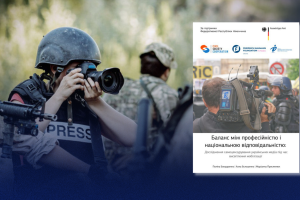The nationwide survey was conducted by the Ilko Kucheriv Democratic Initiatives Foundation jointly with the sociological service of the Razumkov Center from May 14 to May 19, 2021, via face-to-face interviews at the respondents’ place of residence. 2020 respondents aged over 18 y.o. were interviewed in all regions of Ukraine, except for Crimea and the occupied territories of the Donetsk and Luhansk oblasts/regions, a sample representative of the adult population according to the key socio-demographic indicators. The theoretical sampling error does not exceed 2.3%.
The data used as a point of refence comes from the surveys conducted by the Ilko Kucheriv Democratic Initiatives Foundation jointly with the sociological service of the Razumkov Center from July 3 to July 9, 2020 and from June 13 to June 20, 2019 in all regions of Ukraine, except for Crimea and the occupied territories of the Donetsk and Luhansk oblasts/regions.
The survey was funded as part of the MATRA project of the Embassy of the Kingdom of the Netherlands.
1. The feedback of Ukrainians regarding the health care system has remained unchanged since DIF first conducted a survey the topic in 2019. Ukrainians believe that it has become easier to choose a primary care doctor (44%) and medicine prices increased (41%) during the past year. 16% of respondents noted no change in the state of the Ukrainian health care system. A quarter of respondents mentioned that they personally observed one of the following changes and phenomena during the past year:
- the lack of qualified help from the medical personnel during an illness (29%);
- the de-facto paid nature of medical tests and diagnostics, which are supposed to be provided free of charge (26%);
- the longer and more difficult process of scheduling an appointment or obtaining medical references/documentation (23%);
- the worsening of the emergency medical services’ quality and response time;
- the decrease of the emergency medical services response time (increased slightly in 2021 – 7%; 2020 – 5%; 2019 – 8%).

The comparison of the survey data from 2021 to the data from the earlier periods reveals a curious paradox. On one hand, Ukrainians note that it has become easier to schedule an appointment or obtain medical references/documentation: 17% of respondents agreed with this statement in 2021, but in 2020 only 12% of respondents did. At the same time, 23% of Ukrainians surveyed in 2021 note that it has become more difficult to schedule an appointment or obtain medical references/documentation: 19% of respondents agreed with this statement in 2020, but in 2019 only 17% of respondents did.
The increasing medicine prices (40%) and the worsening of the emergency medical services’ quality and response time (20%) have remained top concerns for three years.
Fewer citizens report access to free medications: in 2019, 16% of respondents did; in 2020 – 13.5% of respondents did; in 2021 – only 11.8% (one out of eight) did.
Ukrainians report gaining access to free vaccination: in 2020, when the COVID-19 pandemic was gaining momentum, only 5% of respondents indicated that they had the opportunity to get vaccinated. In 2021, 9% of respondents did.
Still, the monitoring of the public opinion between 2019 and 2021 indicates that citizens believe that the healthcare system changed for the worse in these crucial regards:
- The proportion of respondents who reported the lack of qualified help from the medical personnel during an illness increased from 25% to 29%;
- The proportion of respondents who report the de-facto paid nature of medical tests and diagnostics, which are supposed to be provided free of charge increased from 19% to 26%; at the same time the proportion of those who receive these services for free remained almost unchanged: 14% in 2019 and 15% in 2021;
- 9% of respondents noted that the informal cost of visiting a doctor increased. Only 2% noted that informal payments decreased, and only 3% reported not witnessing the practice.

Overall, respondents in different regions have similar concerns about the healthcare system. Still, the residents of the South reported that they are more likely than the respondents from the other regions to easily choose or change their primary care doctor (54%) and face the de-facto paid nature of medical tests and diagnostics, which are supposed to be provided free of charge (39%).
The most sticking differences between the responses from the different regions emerges when it comes to informal payments: 25% highlighted the issue in the South, 3% in the West, and 8-9% in the Center and East of the country.
The issue of getting qualified medical assistance during an illness is less severe in the West (19%), whereas in other regions every third respondent reported the issue.

2. A third of respondents (33%) noted that they had to pay extra for doctor appointments, medical procedures (injection, bandage, etc.) or diagnostics (X-ray, ultrasound, etc.), and 35% of respondents did not face an incident like this; 29% of respondents are not interested in these medical services.

Compared to previous periods when the study was held, the proportion of those who have to pay extra for these services remains unchanged. At the same time, the proportion of those who did not face an incident like this increased (2020 – 23%; 2021 – 35%)

3. 68% of Ukrainians do not agree that patients can and should provide extra remuneration to doctors to guarantee quality medical assistance in the future. Respondents in all regions do not support the practice, and most of the residents of the South (77%) oppose it.

Compared to the data from the 2019 survey, the most recent data shows that the proportion of those who do not support the measure decreased by more than 9% between 2019 and 2021.
At the same time, the proportion of those who support the practice decreased by 6%.

4. On average, Ukrainians spend between 200 and 500 on medicine and treatment per month, which is true of all regions.

Those aged 60+ y.o. spend most on medicine.

Since 2020, the proportion of those who do not spend money on treatment and treatment saw a two-fold decrease. Consider this evidence and the growing proportion of responses to individual questions of the survey an indication that Ukrainians need medical assistance more often. One explanation is the COVID-19 pandemic – almost 20% of Ukrainians contracted the virus, which increased the demand for medicine and medical services.

5. The survey showed that two thirds (63%) of Ukrainians believe that the decrease of drug prices is the foremost task of the healthcare reform. This issue is especially relevant to those aged over 60 y.o. (73%)

The residents of the Southern regions/oblasts also highlight that anti-corruption measures (34%) and free COVID-19 testing (25%) are important issues.

These are the tasks that have remained a priority for at least a third of respondents between 2019 and 2021:
- provision of hospitals with high-quality equipment for treatment and diagnostics;
- the institution of responsibility by the medical personnel for the health of patients and treatment results;
- the increase in the number of professional primary care doctors.
The provision of emergency medical assistance, including in remote locations, remains an important issue, but the proportion of those who reported this task decreased, which may mean that the provision of the local emergency medical assistance posts improved.
The proportion of those who believe that corruption is a foremost issue has not decreased between 2019 and 2021, a fact that deserves special attention. Although Ukrainians pay extra for medical services less often, the data shows that the proportion of those who believe that corruption is an important issue remains high.
In 2019, 21% of Ukrainians believed so. In 2020, due to the more important issues, such as the COVID-19 pandemic, the proportion fell to 12%. In 2021, the proportion increased to 21%. Thus, corruption remains prevalent, but so does the recognition of the issue by the citizens.

6. In 2020, DIF supplanted the survey with the questions that concern the COVID-19 pandemic, which allow one to track the changes in the public opinion towards the pandemic-related issues during the past year.
Overall, 23% of Ukrainians reported contracting the virus. In July 2020, 91.5% reported not contracting the virus, but in May 2021 72% of respondents did (5% were undetermined). 53.5% reported their family members not contracting coronavirus, but 54% reported their friends contracting the virus.
The proportion of those who reported contracting the virus is similar across the different regions: in Eastern and Western regions, more than 25% reported contracting the virus, and in the West and Center 20% did.
2021

Youth aged 18-29 y.o. and those over 60 y.o. were the age groups least likely to contract the coronavirus (19% and 20%). Overall, around 70% of respondents that represent other groups did not contract the coronavirus.

7. Around a third of respondents believe that doctors and those employed in the medical sector (36%) were most effective in countering the COVID-19 pandemic in February-April 2021 during the third wave; the local governments (20%) are believed to be the second most effective group; central government (18.4%) – the third most effective group.

Among the residents of the South, there is a higher proportion of those (31%) who believe that the local government countered the pandemic most effectively as compared to the national average.

39% of those who support the “Servant of the People” party believe that the central government was most effective in countering the COVID-19 pandemic. These respondents believe that doctors and medical personnel (36%) were the second most effective group.

Similarly to the survey results from 2020, the new data shows that doctors and medical personnel are still believed to be most effective in countering the pandemic. Volunteers and NGOs, mass media, and local entrepreneurs were believed to be somewhat less effective in 2021 than they were in 2020.

8. Overall, half of Ukrainians (51%) believe that the Ministry of Health of Ukraine bears most of the responsibility for the quality of medical services and the provision of medical institutions during the COVID-19 pandemic. The Southern region has a higher proportion of respondents who believe so (71%), as compared to other regions.

21% of respondents believe that the responsibility lies with the President of Ukraine. Among the supporters of the “Servant of the People” and “Batkivschshyna” parties, the proportion of those who believe that the President is responsible is average, and among those who support the “Opposition Platform – for Life” and “European Solidarity” parties the proportion is higher than the national average (28% and 27%).

Overall, the data shows that the public opinion in this regard did not change significantly, as compared to the data from 2020. Still, the proportion of those who believe that the President is responsible increased by 4%.









